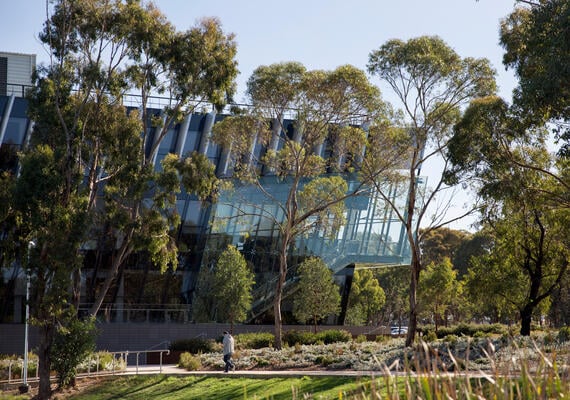
Sustainability on campus
See how we are turning our commitments into impact on campus and throughout the University. Together with students, academics, researchers and partners we are creating living laboratories for sustainable development.
Our sustainability practices are connected to our respect for the Traditional Custodians of the lands on which our campuses reside and the waterways that run alongside them. We acknowledge Elders past, present and emerging and thank them for nurturing and caring for Country, which sustains us all.

See how we are turning our commitments into impact on campus and throughout the University. Together with students, academics, researchers and partners we are creating living laboratories for sustainable development.
We place sustainability at the centre of our research, creating positive change for local and global communities. Our researchers are committed to discovering solutions to the biggest environmental challenges.
Study at Deakin and help solve global issues such as climate change. Deakin offer a range of courses and study units related to sustainability. Gain the knowledge, skills and real-world experience to promote sustainable development.
At Deakin, we’re committed to building a sustainable, wonderful world through innovative research. Our aim is to become carbon neutral by 2025.
It’s the charger of our furry friend's batteries and Deakin's Renewable Energy Microgrid. Did you know our solar farm, a component of the microgrid, is one of the largest on an Australian university campus?

Deakin’s sustainability commitments are aligned to the United Nations Sustainable Development Goals (SDGs), with targets set for 2025 and 2030. These commitments will have benefits on campus, within our communities and, more broadly, at a global level. We integrate economic, environmental and social dimensions of sustainability in all that we do. Our commitments and targets include:
We're on target for our suppliers to meet our 2025 sustainable procurement principles, plus by 2030, our supply chain will have a measurable positive impact on the United Nations SDGs.
We're taking action to enhance public transport, ride-share and active transport options so that by 2030 most staff and students will use sustainable transport to and between campuses.
The University will achieve carbon neutral and 100% renewable electricity by 2025. We aim to be carbon negative by 2030 by further reducing our energy consumption and offsetting emissions.
By applying waste avoidance and circular economy principles, we will reduce waste to landfill to 10kg per person by 2025, with the goal to reach zero waste to landfill in 2030.
We’re reducing our water consumption using best-practice water management in our 5-star water-efficient buildings. By 2030 we will holistically manage our impact on the water cycle.
We’re reviewing and adapting our buildings to the changing climate. Every new Deakin building will offset its own sustainability impacts by 2030.
Deakin is enhancing the biodiversity of our campuses’ environment and waterways. We plan to establish biodiversity corridors by 2030, allowing wildlife to thrive on campus.
With over 65,000 students studying at Deakin, we are in the privileged position to educate and inspire society’s future leaders, foster research solutions to local and global challenges, and use our campuses as living laboratories for field-scale innovations in sustainability.
Professor Iain Martin
Vice-Chancellor
Our Climate Ready Campuses evolved in 2023 with impactful projects bringing to life the climate mitigation, climate adaptation, water and biodiversity pillars. These meaningful changes have reduced our impact while preparing our campuses to cope with the predicted changes in climate.
Our progress in 2022 is helping us to realise our climate ready campus vision. Last year, nearly 20% of our energy came from renewable sources and we provided staff and students with more sustainable transport options. We also began work on converting the chain of ponds running through the Waurn Ponds Campus into constructed wetlands.
In 2021, we began phase one of our Carbon Neutral 2025 program to reduce emissions. We installed over 1000 rooftop solar panels and new LED car park lighting at our Burwood Campus, reducing its energy consumption by 31%.
Deakin launched its Climate Ready Campus vision for the Waurn Ponds Campus and developed an Integrated Water Management Plan. We saw a 28% reduction in energy consumption and we almost halved our water use.
There has never been a more important time to focus on reducing our operational emissions. Deakin is committed to becoming carbon neutral by 2025 through renewable energy.
We are committed to advancing local actions that contribute to a global agenda. The University focuses on the following within our sustainability initiatives.
Partnerships: Develop and foster strategic partnerships that support Deakin’s sustainability commitments, teaching, research and our community.
Embedment: Integrate sustainability principles in planning, governance and decision making across the University.
Innovation: Use the campuses as living laboratories to foster action-based research, learning and innovation that supports Deakin’s commitments.
Participation: Create meaningful opportunities for students, staff and the broader Deakin community to participate and contribute to sustainability.
Engagement: Report and communicate about sustainability at Deakin to transparently disclose performance, demonstrate leadership, advocate for sustainability and inspire others.
Get in touch with us to find out more about Deakin's sustainability commitments.